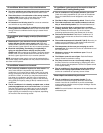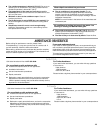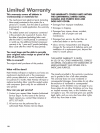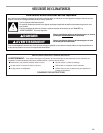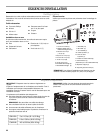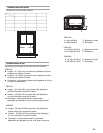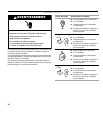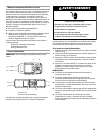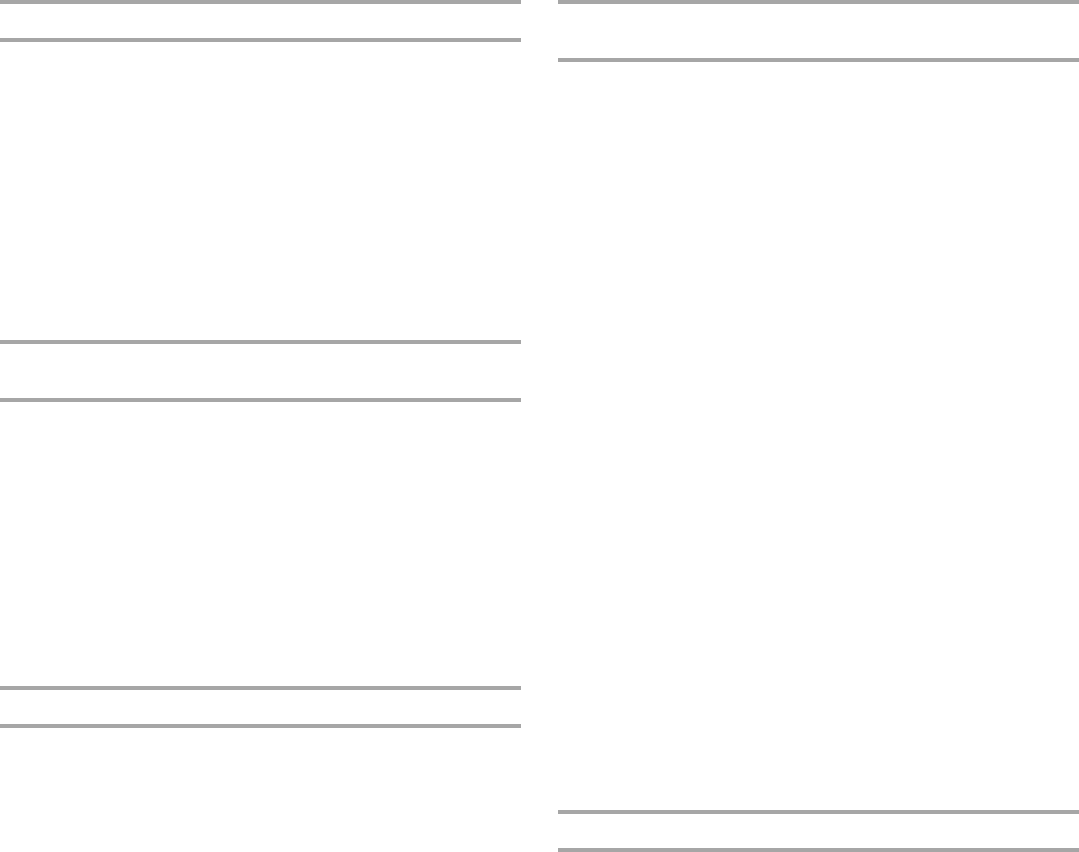
18
Air conditioner blows fuses or trips circuit breakers
■
Too many appliances are being used on the same circuit.
Unplug or relocate appliances that share the same circuit.
■
Time-delay fuse or circuit breaker of the wrong capacity
is being used. Replace with a time-delay fuse or circuit
breaker of the correct capacity. See “Electrical
Requirements.”
■
An extension cord is being used. Do not use an extension
cord with this or any other appliance.
■
You are trying to restart the air conditioner too soon after
turning off the air conditioner. Wait at least 3 minutes after
turning off the air conditioner before trying to restart the air
conditioner.
Air conditioner power supply cord trips (Reset button
pops out)
■
Disturbances in your electrical current can trip (Reset
button will pop out) the power supply cord. Press and
release RESET (listen for click; Reset button will latch and on
some devices, a green light will turn on) to resume operation.
■
Electrical overloading, overheating, cord pinching or
aging can trip (Reset button will pop out) the power
supply cord. After correcting the problem, press and release
RESET (listen for click; Reset button will latch and on some
devices, a green light will turn on) to resume operation.
NOTE: A damaged power supply cord must be replaced with a
new power supply cord obtained from the product manufacturer
and must not be repaired.
Air conditioner seems to run too much
■
The current air conditioner replaced an older model. The
use of more efficient components may cause the air
conditioner to run longer than an older model, but the total
energy consumption will be less. Newer air conditioners do
not emit the “blast” of cold air you may be accustomed to
from older air conditioners, but this is not an indication of
lesser cooling capacity or efficiency. Refer to the efficiency
rating (EER) and capacity rating (in Btu/h) marked on the air
conditioner.
■
The air conditioner is in a heavily occupied room, or heat-
producing appliances are in use in the room. Use exhaust
vent fans while cooking or bathing and try not to use heat-
producing appliances during the hottest part of the day. A
higher capacity air conditioner may be required, depending
on the size of the room being cooled.
Air conditioner cycles on and off too much or does not
cool/heat room in cooling/heating mode
■ The air conditioner is not properly sized for your room.
Check the cooling capabilities of your room air conditioner.
Room air conditioners are not designed to cool multiple
rooms.
■
The filter is dirty or obstructed by debris. Clean the filter.
■
The inside evaporator and outside condenser coils are
dirty or obstructed by debris. See “Annual Maintenance.”
■
There is excessive heat or moisture (open container
cooking, showers, etc.) in the room. Use a fan to exhaust
heat or moisture from the room. Try not to use heat-
producing appliances during the hottest part of the day.
■
The louvers are blocked. Install the air conditioner in a
location where the louvers are free from curtains, blinds,
furniture, etc.
■
The outside temperature is below 65°F (18°C). Do not try to
operate your air conditioner in the cooling mode when the
outside temperature is below 65°F (18°C).
■
The temperature of the room you are trying to cool is
extremely hot. Allow extra time for the air conditioner to cool
off a very hot room.
■
Windows or doors to the outside are open. Close all
windows and doors.
■
The Exhaust control is set to Open. Push the Exhaust
control Closed for maximum cooling.
■
The Temp control is not at a cool enough setting. Adjust
the Temp control to a cooler setting by pressing the minus
button to reduce the temperature. Set the Fan Speed control
to the highest setting.
■
The air conditioner in the heating mode has insufficient
Btu/h for the heating requirements of the room. Do not
use the air conditioner as a primary source of heat.
Water drips from cabinet into your house
■
The air conditioner is not properly leveled. The air
conditioner should slope slightly downward toward the
outside. Level the air conditioner to provide a downward
slope toward the outside to ensure proper drainage. See the
Installation Instructions.
NOTE: Do not drill a hole in the bottom of the metal base and
condensate pan.











